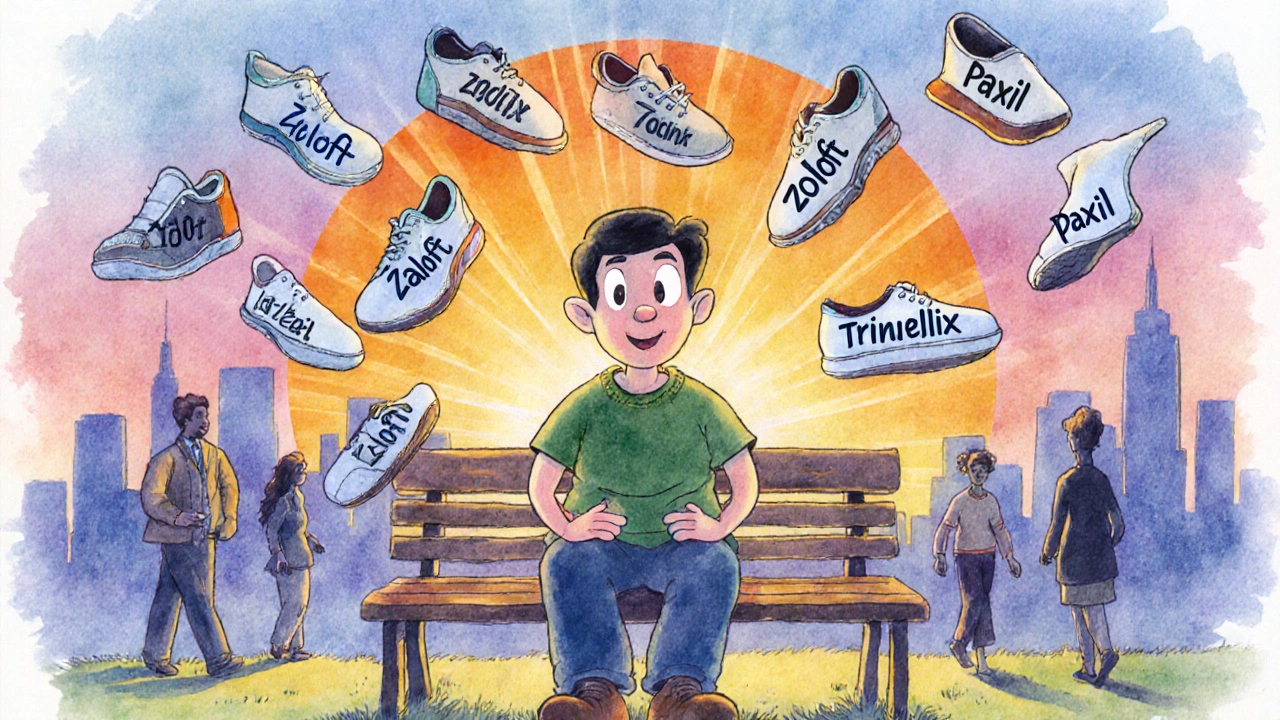Choosing the right antidepressant isn’t about picking the most popular one-it’s about finding what fits your body, your symptoms, and your life. Zoloft (sertraline) is one of the most prescribed SSRIs in the U.S., but it’s not the only option. If you’re wondering whether Zoloft is right for you-or if another medication might work better-here’s a clear, no-fluff breakdown of how it stacks up against other common antidepressants.
What Zoloft (Sertraline) Actually Does
Zoloft is the brand name for sertraline, a selective serotonin reuptake inhibitor (SSRI) approved by the FDA in 1991 for treating depression, OCD, panic disorder, PTSD, and social anxiety. It works by increasing serotonin levels in the brain, which helps regulate mood, sleep, and anxiety.
Unlike older antidepressants like tricyclics or MAOIs, Zoloft doesn’t cause major blood pressure spikes or require strict diet restrictions. That’s why it became a first-line choice for doctors. About 1 in 12 U.S. adults take an SSRI, and sertraline is among the top three most prescribed.
But here’s the catch: while Zoloft works well for many, about 30-40% of people don’t get full relief from it-or they can’t tolerate the side effects. That’s why alternatives matter.
How Zoloft Compares to Other SSRIs
SSRIs are the most common type of antidepressant. They all target serotonin, but small differences in how they’re absorbed, metabolized, and how they bind to receptors can change your experience.
Here’s how Zoloft stacks up against three other widely used SSRIs:
| Medication | Active Ingredient | Typical Starting Dose | Half-Life | Common Side Effects | Best For |
|---|---|---|---|---|---|
| Zoloft | Sertraline | 50 mg/day | 26 hours | Nausea, diarrhea, insomnia, sexual dysfunction | Depression, OCD, PTSD, social anxiety |
| Lexapro | Escitalopram | 10 mg/day | 27-32 hours | Nausea, fatigue, drowsiness, decreased libido | Generalized anxiety, depression |
| Prozac | Fluoxetine | 20 mg/day | 4-6 days | Insomnia, nervousness, weight loss, jitteriness | Long-term maintenance, OCD, bulimia |
| Paxil | Paroxetine | 20 mg/day | 21 hours | Drowsiness, weight gain, dry mouth, sexual side effects | Panic disorder, social anxiety, GAD |
Key takeaways:
- Zoloft has a moderate half-life-meaning it clears from your system faster than Prozac but slower than Paxil. This makes it easier to adjust doses without extreme withdrawal spikes.
- Lexapro is often better tolerated than Zoloft, especially for anxiety-heavy cases. Some studies show slightly higher response rates in generalized anxiety disorder.
- Prozac’s long half-life can be a double-edged sword: it helps with missed doses but makes side effects linger longer if they occur.
- Paxil tends to cause more weight gain and sexual side effects than Zoloft, which is why many doctors avoid it as a first choice.
SNRIs: A Different Path
SNRIs like Cymbalta (duloxetine) and Effexor (venlafaxine) work on both serotonin and norepinephrine. That’s a bigger net than SSRIs. For people with depression plus chronic pain, fibromyalgia, or severe fatigue, SNRIs can be more effective.
Effexor, for example, has shown stronger results in clinical trials for treatment-resistant depression. But it’s more likely to raise blood pressure and cause nausea, especially at higher doses. Many patients switch from Zoloft to Effexor when SSRIs aren’t enough-but only after trying multiple SSRIs first.
Cymbalta adds pain relief to the mix. If you’re dealing with depression and lower back pain or diabetic nerve pain, Cymbalta might be a better fit than Zoloft alone.
Bupropion: The Non-SSRI Option
Wellbutrin (bupropion) is the odd one out. It doesn’t touch serotonin at all. Instead, it boosts dopamine and norepinephrine. That makes it unique.
Why does that matter? Because if you’re struggling with low energy, brain fog, or sexual side effects from Zoloft, Wellbutrin might help where Zoloft fails.
Studies show that adding bupropion to an SSRI like sertraline improves energy and libido in up to 60% of patients who had those side effects. Some doctors even prescribe it as a standalone treatment for depression with fatigue.
Downside? Wellbutrin can cause anxiety or insomnia in some people. It’s also not recommended if you have a history of seizures or eating disorders.

Other Alternatives: What Else Is Out There?
Not everyone responds to SSRIs or SNRIs. For those who don’t, there are other options:
- Mirtazapine (Remeron): Helps with sleep and appetite, but causes weight gain and drowsiness. Often used when insomnia or poor appetite accompanies depression.
- Vortioxetine (Trintellix): A newer antidepressant with a complex mechanism. May improve cognitive symptoms like memory and focus better than Zoloft. More expensive, but useful if brain fog is a big issue.
- Agomelatine: Not available in the U.S., but used in Europe. Works on melatonin receptors to reset sleep cycles. Good for depression with severe insomnia.
These aren’t first-line choices, but they’re important tools when standard treatments don’t work.
When Zoloft Might Not Be the Best Fit
Zoloft is a solid, reliable option-but it’s not perfect for everyone. Here’s when you might want to consider something else:
- You’re gaining weight or losing sex drive-try bupropion or vortioxetine.
- You’re too tired all day-Wellbutrin or SNRIs might help more.
- You’re having panic attacks or severe anxiety-Lexapro or Paxil may work faster.
- You’ve tried Zoloft for 8-12 weeks at full dose and feel no improvement-time to switch, not just increase the dose.
- You’re pregnant or planning to be-sertraline is still one of the safest SSRIs during pregnancy, but paroxetine and fluoxetine carry higher risks. Talk to your OB-GYN.
One big myth: switching antidepressants means you’ve “failed.” That’s not true. It’s like trying different shoes until you find ones that don’t pinch. Your brain chemistry changes. Your needs change. Your medication should too.
How Long Does It Take to Know If It’s Working?
Most antidepressants take 4-6 weeks to show real effects. Zoloft is no different. Some people feel a little better in 2 weeks, but full improvement usually takes longer.
Don’t quit after 3 weeks because you “don’t feel it.” Side effects often show up before benefits. That’s normal. If you’re still struggling after 10-12 weeks at the maximum tolerated dose, it’s time to talk about alternatives.

What About Natural Alternatives?
St. John’s Wort, omega-3s, and exercise are often suggested as “natural” antidepressants. But here’s the reality:
- St. John’s Wort can interact with birth control, blood thinners, and other meds. It’s not safe to mix with SSRIs.
- Omega-3s might help a little with mood, but not as much as medication for moderate to severe depression.
- Exercise has strong evidence for mild depression-but it’s not enough alone for clinical depression.
These can support treatment, but they’re not replacements. If you’re considering them, talk to your doctor first.
Final Thoughts: It’s Not About the Best Drug-It’s About the Right One
Zoloft is a great tool. It’s been studied for decades, it’s affordable, and it works for millions. But it’s not the only tool-and it’s not always the best one for you.
The goal isn’t to find the “best” antidepressant. It’s to find the one that helps you feel like yourself again, without making you feel worse in other ways.
Start with Zoloft if your doctor recommends it. But if it doesn’t work-or if the side effects are too much-don’t give up. There are other options. And you deserve to find the one that fits.
Is Zoloft better than Lexapro for anxiety?
Lexapro (escitalopram) may have a slight edge for generalized anxiety disorder. Some studies show higher response rates and better tolerability compared to sertraline. But for social anxiety or PTSD, Zoloft has more evidence. The difference is small-both are effective. The best choice often comes down to side effects and how your body responds.
Can I switch from Zoloft to another antidepressant myself?
No. Stopping Zoloft suddenly can cause withdrawal symptoms like dizziness, brain zaps, nausea, or mood swings. Switching antidepressants requires a careful taper and overlap period under medical supervision. Never change your dose or switch meds without talking to your prescriber.
Does Zoloft cause weight gain?
Zoloft can cause weight gain over time, but it’s less likely than with Paxil or mirtazapine. About 10-15% of users gain more than 7% of their body weight after a year. If weight is a concern, bupropion or vortioxetine are better options.
How do I know if I need to switch from Zoloft?
You should consider switching if: your depression hasn’t improved after 8-12 weeks at the maximum tolerated dose, side effects are worse than your symptoms, or you’re experiencing sexual dysfunction, weight gain, or extreme fatigue that affects your daily life. Talk to your doctor before making any changes.
Are there any natural supplements that work like Zoloft?
No supplement works like Zoloft. St. John’s Wort has some evidence for mild depression, but it’s not reliable for moderate to severe cases and can interfere with other medications. Omega-3s and exercise help as supports, not replacements. Always check with your doctor before using supplements with antidepressants.
Next Steps: What to Do If You’re Not Feeling Better
If you’re on Zoloft and still struggling:
- Track your symptoms for 2 weeks using a simple mood journal-note sleep, energy, appetite, and anxiety levels.
- Check your dose. Many people stay on 50 mg, but 100-200 mg is often needed for full effect.
- Ask your doctor about adding therapy (CBT is especially effective with medication).
- If no change after 12 weeks, discuss switching to Lexapro, Wellbutrin, or an SNRI.
- Consider a genetic test (like GeneSight) if you’ve tried multiple meds without success. It can show how your body metabolizes drugs.
There’s no shame in trying something else. Finding the right treatment takes time, patience, and persistence. You’re not broken-you’re just still searching for the right fit.


Sam Reicks
November 18, 2025 AT 20:29zoloft is just big pharma's way of keeping us docile while they sell us more pills
they dont want you cured they want you dependent
the real cure is quitting society and living off grid
Chuck Coffer
November 18, 2025 AT 20:55of course zoloft works for some people. the rest of us just have weak wills and need to stop being dramatic about our feelings
Marjorie Antoniou
November 19, 2025 AT 07:11thank you for this clear breakdown. i struggled for years thinking something was wrong with me until i switched from zoloft to lexapro and finally felt like myself again. it's not weakness to need help-it's courage to keep trying.
Andrew Baggley
November 19, 2025 AT 23:43you’re absolutely right-there’s no magic bullet but there are so many paths. i tried zoloft, hated the brain fog, switched to wellbutrin and suddenly i could get out of bed without crying. it’s not about failing-it’s about finding what lets you breathe again. you’re not broken, you’re just waiting for the right fit.
Frank Dahlmeyer
November 20, 2025 AT 14:53listen i’ve been on like six different meds over ten years and let me tell you something-none of them work unless you’re also doing the work. therapy, walking every day, cutting out sugar, sleeping at the same time, no doomscrolling before bed. meds are just the starter pack. the real change comes from showing up for yourself even when it hurts. zoloft? fine. but if you think a pill alone fixes your life you’re kidding yourself. i’ve been there. you can do better.
Codie Wagers
November 21, 2025 AT 04:54The fundamental flaw in pharmaceutical psychiatry is its reductionist paradigm: it assumes emotional suffering can be chemically homogenized, thereby erasing the existential dimension of human anguish. Sertraline does not address alienation; it merely masks it with serotonergic camouflage. The true pathology lies not in synaptic imbalance but in the ontological dislocation wrought by late capitalism’s commodification of affect.
Paige Lund
November 21, 2025 AT 19:24so basically zoloft is the iphone 12 of antidepressants-everyone has one but nobody really loves it.
Christopher K
November 22, 2025 AT 06:57why are we letting corporations tell us how to feel? in america we don’t need pills-we need grit. if you’re depressed maybe you should get a job instead of whining about serotonin. this is why our country is falling apart-everyone wants a shortcut instead of working hard.
Brian Rono
November 22, 2025 AT 09:25zoloft is the beige couch of antidepressants-bland, safe, and universally tolerated but utterly forgettable. lexapro? that’s the velvet chaise. wellbutrin? the espresso shot in a leather armchair. and let’s be real-paxil is the uncle who shows up drunk to thanksgiving and won’t leave. choose your vibe, not the algorithm.
seamus moginie
November 22, 2025 AT 14:04i was on zoloft for 3 years and it made me feel like a ghost in my own body
switched to vortioxetine and suddenly i could remember my own name again
if you’re still stuck after 12 weeks-dont wait
your mind deserves better than patience
Zac Gray
November 24, 2025 AT 08:51the real hero here isn’t zoloft-it’s the person who kept going after the first pill made them nauseous for two weeks and the second pill gave them brain zaps and the third made them feel like a robot
you didn’t fail because it didn’t work right away-you won by not giving up
keep looking. your brain isn’t broken. it’s just waiting for the right key.
Steve and Charlie Maidment
November 25, 2025 AT 17:58why are we even talking about this? everyone knows antidepressants are just placebos with extra steps. the real solution is to stop being so sensitive and just toughen up. my grandpa worked 80 hours a week during the depression and never took a pill. maybe if we all stopped being so weak we wouldn’t need these things.
Ellen Calnan
November 26, 2025 AT 00:35i used to think my depression was a moral failing-until i realized my brain chemistry was literally rewriting my perception of reality. zoloft didn’t fix me. it just gave me enough quiet to hear myself again. the real medicine? time. therapy. and the radical act of believing i deserved to feel better. not because i earned it-but because i’m alive.
Richard Risemberg
November 26, 2025 AT 05:25you know what’s wild? we treat broken bones with x-rays and casts, but when your brain’s out of whack we tell you to "just be positive"? that’s not mental health care-that’s negligence wrapped in a smile. zoloft isn’t perfect, but it’s one tool in a toolbox that’s been starving for decades. let’s stop shaming people for using it and start demanding better options for everyone.